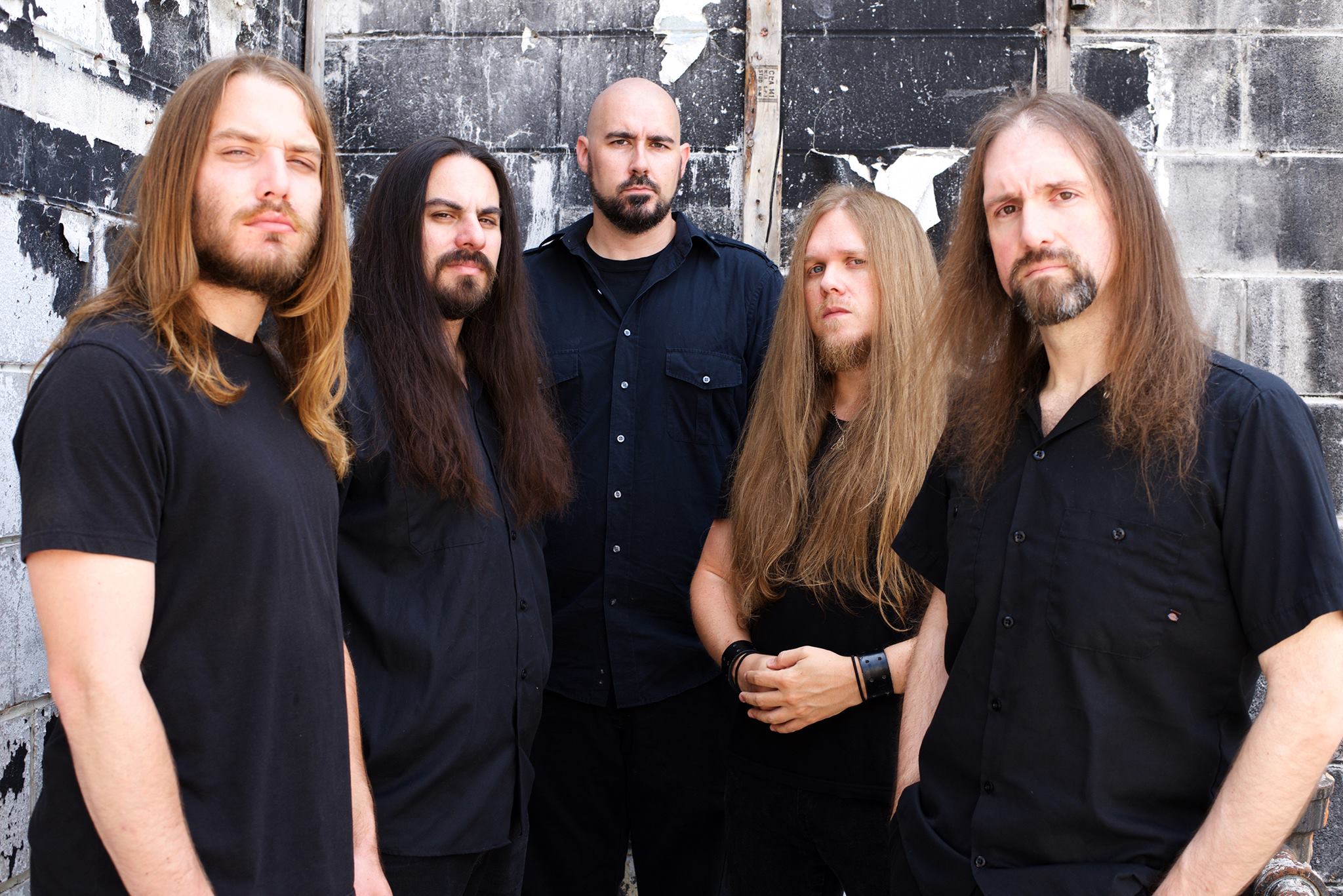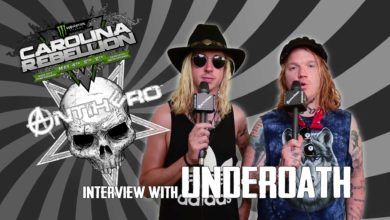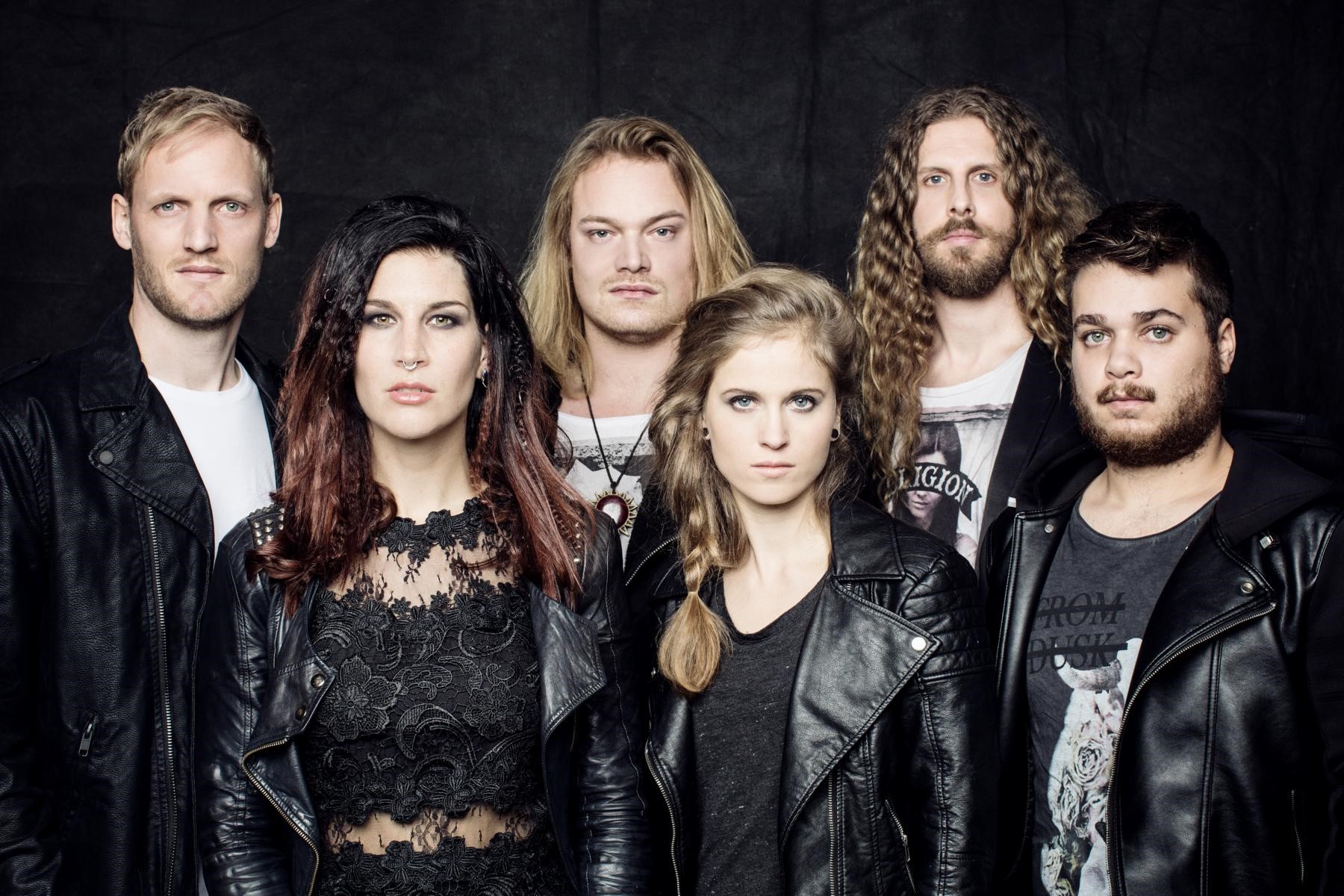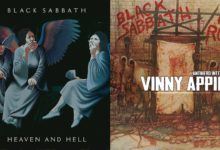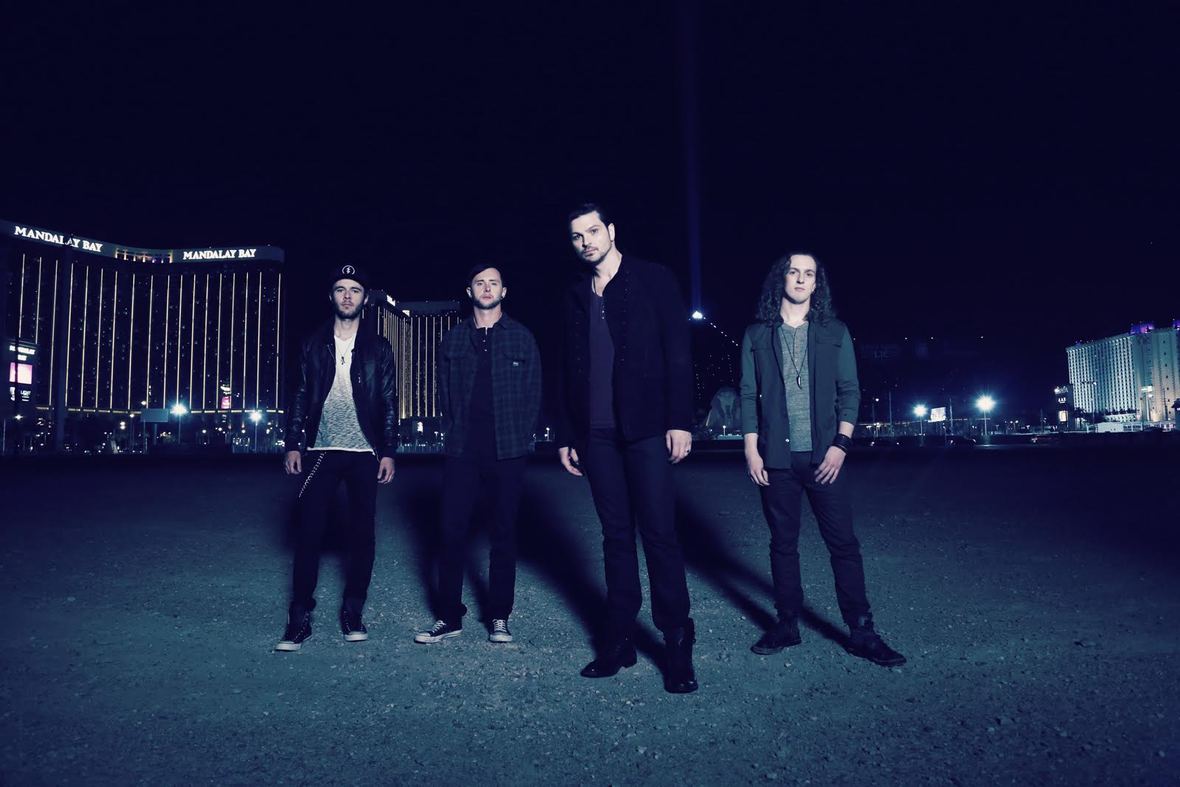Chicago doom metal juggernaut, Novembers Doom, will release their tenth full-length album, titled Hamartia, on The End Records in April of 2017. Antihero Magazine’s Scott Martin had a chat with frontman Paul Kuhr about the upcoming album, the band’s songwriting process, as well as plans for upcoming tours and much more!
AH: Could you tell me a little bit about the history of Novembers Doom?
Paul Kuhr: Absolutely. Going way back to 1989, the band had formed in the basement of my parents’ house, actually. Me and a guitar player named Steve Nicholson, we started off as more of a thrash kind of metal band. It wasn’t the metal that it is now and we took different influences from different styles of music and different bands that we’re doing things at the time. Like, I really like the vocal style of Grave and there were some local bands, Devastation and Syndrome from Chicago, which were big metal bands at the time here.
There were a lot of things I wanted to incorporate into what we were doing, more than just the thrash kind of thing, and we really liked the heaviness and down tuning of the guitars. At the time, Steve didn’t realize putting on thicker strings and down-tuning a guitar would, you can still play with the speeds. Down tune the strings and they got really floppy.
It made more sense to slow the music down. It was on… I don’t want to say it was on accident we fell into the style of music we did because we definitely liked the heaviness, but it was a lot of you play with what you have at the time and you make it work. That’s basically how it got started all the way back in 1989.
 AH: You have a new album coming out. Can you tell me a little bit about that, about the recording process? Same band members as the last album?
AH: You have a new album coming out. Can you tell me a little bit about that, about the recording process? Same band members as the last album?
Paul Kuhr: That’s the first time in the history of the band that we recorded two albums back to back with the exact same lineup. Usually, someone changes. We get a new bass player or we have to get a new drummer, something like that along the line and it’s usually people have moved on or they’ve moved on in their life. They’re not doing music. They moved away somewhere else in the country and logistically, it just became impossible for them to still be in the band with us.
Yeah, this is the first time where all five core members have recorded two albums in a row. That being said, this album coming out, it’s called Hamartia.
It is definitely a logical step forward from Bled White. I think anybody that listens to this, we are definitely progressing as a band and musicians in our songwriting, but I think if there’s one thing people who have listened to it and even we pointed out, there is a little bit darker element to it than Bled White. There’s a bit of like the Pale Haunt Departure album kind of feeling mixed in with some Bled White.
It’s a nice mixture of everything you’d expect from the band with a bit of a progression forward and I think just musically, song writing, vocally, we always try to push ourselves each album just to make a better record.
AH: Would you say this is your best release to date?
Paul Kuhr: Every band always says that. They record a new album, it’s their job to promote and push that album and they have to say that. They have to say, “Yeah, this is the best thing we’ve ever done,” and I truly believe that this time. It’s one of those things we put in a lot of effort into this one where we thought we were going to struggle.
It’s our tenth album and when you get to around 9 – 10 albums, you start to second guess. Is what we’re doing good enough anymore? Can we top the last album? It’s something that we’ve always tried to do over and over and over again. We have to make a better album than the previous one.
Well, what does that fall into? Better for who? Better for the fans? Better for what people expect or better for us as musicians? To us, it’s always about us first. We have to be happy with the material. We have to challenge ourselves to do something different and better. I know a lot of people get upset and they say, ‘Well, I liked your first two, three albums better.’ Awesome and we wrote that stuff for you for that time but this is for us.” We have to keep moving forward and you like it, awesome. That’s just a bonus but I truly, truly, truly feel that yes, this album is the best thing that the band has done so far.
AH: What about plans for the rest of 2017, tours or anything? It doesn’t look like you played too many shows on each year.
Paul Kuhr: No, it’s difficult. We’re all in a position in our lives where we’re all older now. We have families and guys have full-time jobs and we have kids and it does become more and more difficult to get away for any length of time and go on the road and tour. We are very selective on what we can do. Of course, we always try to get the most bang for their buck.
You always want to get the most out of the crowd and out of the money. Money meaning for the fans and things like that. You don’t want to … If we can only play 10 shows a year, I wanted to go where we can reach the most people at one time. Meaning festivals are great. People pay one price for a festival and they get to see all the bands they want to see.
They’re getting a lot of value for their money and I like to be part of that value for them. It also gives us the opportunity to play in front of … we play Graspop, one European festival and we can play for more people at one show than we do in an entire year of playing local shows and things like that. I don’t want to say we’re exclusively only doing festivals, that’s not at all true but if that opportunity arises we’ll usually take that before a 10-day tour. If we did a 10-day tour, that pretty much eliminates us form being able to do anything else in a year.
We’re calculated on what we choose to play these days. No, as of right now for 2017, we are planning some short runs in the United States. We’ll probably do an East Coast run and hopefully Midwest and West Coast run throughout the year and we’re always looking for European opportunities and ‘70,000 Tons of Metal’ and things like that. We do what we can.
AH: Hopefully, you may get out to the San Francisco area sometime soon.
Paul Kuhr: We’ve never been to California. We’ve never been on the West Coast. I would love to do that. We would do it in an instant if we can make it work logistically. If we can find the right promoter or the right booker to put us on a short tour, something like that and it made sense where we can come back and not be broke. We would do it. It’s the only reason we haven’t, it just comes down to logistics.
AH: What is the songwriting process? Is it a band effort? Is it individual? The band has the music, you do the vocals or is it combined?
Paul Kuhr: Usually, the guitar players, Larry and Vito, will come into rehearsal and they’ll either have riffs, a couple of riffs that they string together or sometimes they come in with a full song idea and they’ll present it to the rest of the band. Say Vito will come in and he’ll say, “Hey, I’ve got these three riffs that I think really go well together,” and he’ll play it.
Then Gary will jump in and he’ll add some drums to it, and then that will trigger something in Larry. Larry will be like, “Man, I’ve got something that will fit really well in that.” Or Larry will say, “You know what? I like it but there’s still … Let me take those three riffs home and let me work on them and see if you like what I come up with your stuff.”
It’s a collaboration generally between the two guitar players, but things like drums and things like bass and rhythm, it will change the thought process. It is a long process. It’s very seldom that a guy will come in and say, “Okay. I’ve got a song from beginning to end and here it is,” and it stays like that.
There’s usually changes, or arrangements, or something that changes. It has happened but it’s not often. It’s usually, in that way, an arrangement collaboration. Lyrically, vocally, I do 100% lyrics. Vocally, like Larry and I will get together a bit before the studio if I’m struggling on some spots where I just can’t quite figure out a melody I want to do over guitar lines he’s doing, he’ll work stuff out with me.
I’ll do a lot of working out of harmonies and melodies in the studio with our engineer, Chris. Yeah, I write most of my own vocal melodies and things like that and then it just all comes together at the end.

AH: What about your influences, musical influences, your non-musical influences? Who made you who you are right now?
Paul Kuhr: Yeah, musically, it goes back. I knew I wanted to sing in a band and I wanted to be in this kind of music back in the day from the Chicago bands basically. Devastation and Syndrome from Chicago changed the way I viewed music and being in a band.
I mean, I like so much other stuff other than just metal. I’m influenced by a lot of different things. I like Peter Gabriel, and I like The Doors, and I like the real dramatic approach and the somber approach. I really like Greg Laswell a lot. I think he does a lot of amazing singer/songwriter kind of things like that. I even draw inspiration from things like Coldplay.
I’m into vocals a lot. I really gravitate towards … They don’t even have to be good singers. Like, I never thought Jim Morrison was a good singer, but he was amazing at what he did. I like unique qualities in a vocalist or a singer or something like that. I’m drawn to things like that musically.
I know back in the day like I wanted to do … when I was putting together my own style, I wanted that clarity in my growl like Syndrome and I wanted people to understand the words I was saying, but I wanted the brutality of Grave and early death metal bands like that, so I really worked on “okay, how can I be as audible and as clear in my growl as I possibly can?”
Then I heard things like “Twisted into Form” by Forbidden, and I wanted to add that clean vocal element, and then Celtic Frost did a lot of the female operatic vocal and I wanted to add that into the band.
I grab from a lot of things. Even Larry, Larry who writes a lot of the music is all over the board with even his influences bringing in Pink Floyd and Voivod. People will be amazed at how much of our music is influenced by things other than metal. It’s not much metal influence at all. We take from other areas and we make it what’s ours.
Unfortunately, a lot of the bands in our genre did the exact same thing. They grew up with the same music because we’re all basically old men at this point. We’ve all grown up in the same area and we’ve all borrowed from the same bands building our influences, so that’s why we all sound similar, I guess.
AH: Also, I noticed you’re really influenced by My Dying Bride?
Paul Kuhr: They are very good friends. I’ve known them since we traded demos back in the day so I’ve known them. I can’t say that I’m influenced by that band because I’ve known them from cassette tape demos and we were already doing our band when I discovered them. I’m inspired by them for sure. They’ve reached a level that we would love to be.
I’m inspired by the work they do and they put out such quality that they challenge me to want to be better. I think it’s more like that. It’s not so much as an inspiration drawn from their music. It’s more of inspiring to be the level they’re at and wanting to raise our bar.
AH: Also, I noticed, Opeth. There’s a lot Opeth in your music.
Paul Kuhr: Or does Opeth have a lot of Novembers Doom in their music? We’ve been around …
AH: You’ve probably been around about the same amount of time so you never know.
Paul Kuhr: We had about three albums out before we even knew who that band was. There is absolutely zero influence from Opeth and the back and forth. Yeah, and that back and forth, it comes from Celtic Frost. It comes from bands like that, that helped paved the way. It comes from a mixture of Celtic Frost meets Grave meets Pink Floyd, and that’s where we got where we are.
It had nothing to do with these other bands that did similar things. The unfortunate thing is being from the United States we were overlooked in the early days because all the eyes were on the European bands. We came along when we finally got noticed it was like, “Oh, here’s this American band who’s copied everybody.” Sorry, it didn’t work that way. Our influences came from the same places that theirs may have, but we just didn’t get noticed at the same time they did for geographic reasons, for label choices, for whatever the reasons may be.
AH: Any other projects you’re working on? Are there any other things that you or anybody else in the band are in?
Paul Kuhr: We went on hiatus for a while but These Are They are back together. That’s just a death metal project I started with Steve Nicholson, the original guitar player for Novembers Doom. He had disappeared from my life for many years. We reconnected and said, “Hey, let’s play again” and we started These Are They, just a Chicago death metal band. Put out three records, two EPs in a short amount of time.
He since disappeared again. I haven’t talked to Steve in a couple of years. I was talking with the rest of the guys and we have someone else on guitar at the moment, and we’re writing the fourth album. That should be coming out I don’t know when, hopefully, by the end of this year. We’re working on it. We’re working on another album. It’s pretty much straight up just old school death metal. Like the hooky, catchy kind of death metal, Bolt Thrower and stuff like that.
AH: Is there anything else you would like to add?
Paul Kuhr: Just the album comes out on April 14th on The End Records. The album is called Hamartia. You can check out, “Plague Bird” is up right now, the first track. There is another one being released I think in a couple of weeks, so you will get one or two more releases before the album comes out. Absolutely, check it out because I think it is our best work to date.
AH: I’m looking forward to hearing it. I want to thank you again for spending some time with me.
Paul Kuhr: Absolutely. Thank you very much.

